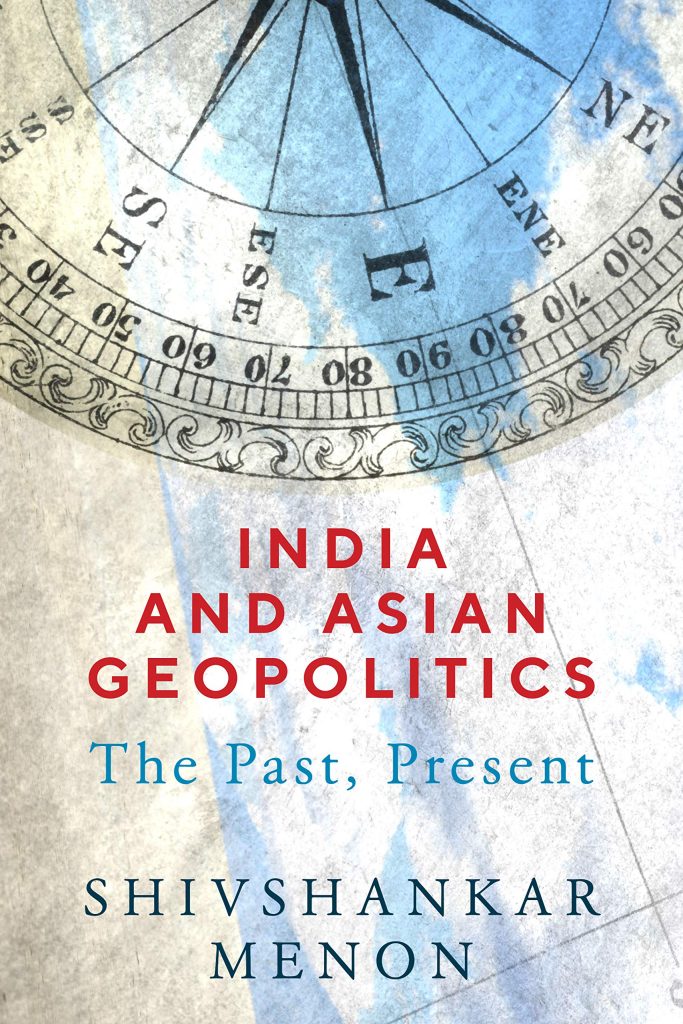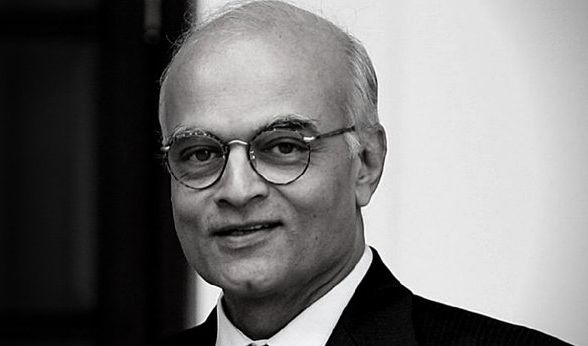
“The intellectual challenge is to develop concepts of India’s place in the world and the order we should seek” (p:340).
In his book India and Asian Geopolitics (The Past, Present), former NSA Mr. Shivshankar Menon has made an attempt to trace and locate the positions of and for India from historical times to post WW – II era and the Cold War period, globalization years and to the present decade. Mr. Menon has divided the book into two parts, one for the past and other the present. Past consumes chunk of the content (eight out of thirteen chapters) while the second half raises critical questions and offers answers to couple of pending issues. On record, Menon places abundant anecdotes, cites rich sources and brings in all his experience as an accomplished diplomat.
Now that Mr. Menon has shifted his position from being a Diplomat to becoming a teacher, this book is a testimony to his adaptability to multiple roles in quick time. The present work of Menon is a successful academic venture of a man who was in the thick of actions during critical times over the past decade as NSA. By taking up the role of a teacher, one can say Mr. Menon has made a right ‘Choice’. That’s the silhouette.
The Past
Primarily, to understand geopolitics is to understand the History of the geographical entities in discussion. Mr. Menon starts of chronicling the past by quoting the classic of kalidasa where the latter describes rulers of Raghukula – asamudra kshitiesanam – those whose territories touched the seashore. Taking a critical note of Indians’ understanding of their own history, much of which is understood keeping Delhi as the center, Menon cites K. M. Pannikar “India has, throughout history, had trouble arousing much interest in the world beyond its borders” (p:17), on the contrary the outward projections of power, influence and export of culture, philosophy and external trading through the coast have been ignored by Historians loyal to the British Raj. When the former NSA says that India needs to develop concepts of it’s own, it goes without saying that India needs to build and invest in institutions and hone the older ones.
Menon says, nonalignment as advocated by Nehru was not really a bloc, but a policy. But it turned out to be a movement in early 1960’s. The first Prime Minister of Independent India was keen on radical reworking of foreign policy and restructuring the state apparatus, which he did with much success, which also became a benchmark for posterity. Menon guides the reader through the ups and downs of India’s positions in Asia during Nehru era seemingly with an awe. Just when the navigator is tempted to draw judgements on the author, Mr. Menon, tilts back and examines the policies that failed to fetch the desired results due to lack of clarity, very little room to manoeuvre, lethargy and complete absence of imagination at critical times both in New Delhi and the Indian mission abroad.
The former NSA doesn’t hesitate to evaluate Nehru objectively as he takes the same liberty with Mr. Modi later in the book.
The former NSA doesn’t hesitate to evaluate Nehru objectively as he takes the same liberty with Mr. Modi later in the book. Nehru’s ineptness to raise the border issue with Mao and with Zhou Enlai hurt the nation deeply, the scars of which remain even today. On his return from China, Nehru sounded his worry to senior MEA officials about China’s “arrogant nationalism” but did too little to prepare India militarily to confront China if it were to assert it’s arrogance across borders (p:78).
But Nehru’s ideas prioritizing legitimacy over power also led him to ignore real threats and ultimately to failures… (p:49). A classic case study of what happens when narcissism takes over national interests. Menon meets, both the legacy and nemesis of Nehru era on equal footing.
Pulls and pressures of Cold War
The book throws ample light on the Cold War years and it’s impact on Asian geopolitics. This is the period when almost all of IndoChina region fell under communist regime. At the height of Cold War Indian economy was in tatters and the country was trying to come out of humiliation in Himalayas in 1962. With America wanting to open up to China in early 1970’s, India had no option but to side with the USSR. The policy of non alignment ended almost officially for India when Henry Kissinger and Jim Carter together forged an alliance with China. It was in a way the need of the hour for USSR too. From here on, Menon starts advocating that, for India, it is important to have relations with other countries and stay domestically focused for it’s own economic transformation (P:367).
When the USSR disintegrated, the V P Singh government was in deep slumber for the sheer lack of decisiveness and will to respond to the situation. Menon comes down heavily on the V P Singh regime, though briefly.
Indira Gandhi had reset much of India’s relations with major powers and had readjusted the postures with considerable success. She could handle domestic pressures and International relations with aplomb is what Menon mentions subtly. When the USSR disintegrated, the V P Singh government was in deep slumber for the sheer lack of decisiveness and will to respond to the situation. Menon comes down heavily on the V P Singh regime, though briefly.

Indian politics takes right turn
At the dawn of the globalization, politics in India had tilted from left to the right. India carried it’s Nuclear program successfully and also managed the ‘wrath’ of the West with robust posturing and decisions. The former NSA grants full marks to Atal Bihari Vajpayee for putting his foot down and declining to send Indian troops to fight for the USA when the country invaded Iraq in 2003. Mr. Menon doesn’t omit to comment on Vajpayee’s nuclear weapons program – “India’s is probably the most democratically discussed nuclear program in the world” (p:219) he says. A compliment from an objective insider is always welcome for any dispensation.
Notes of the Past
India opts for major shift in it’s foreign policy during P.V. Narasimha Rao’s tenure when the “look east policy” was mooted and acted upon with all seriousness. West Asia was met and dealt with equal importance by New Delhi subsequently. By the end of globalization and at the threshold of 2008 crisis, India had made considerable inroads into all the major international forums, also playing an important role in forging and creating few of them. With domestic economy picking up from shambles to almost 6% growth annually, demography no more a burden but serving as a dividend, India had come a long way from staying non aligned in garb of being independent to become a serious Global Player. So is Mr. Menon. A serious chronicler.
The Present
In this part of the book former diplomat brings to perspective the post military world that had morphed into a world of economics. Menon supports his submission citing the demography of the world, the quantum of urbanization in the present and predictions for the future. He draws attention to a scenario where at least “three largest economies will have poor populations, with unsatisfied aspirations and revisionist politics to go with them” (p:241).
The Belt Road initiative of China, increasing naval presence in Indian ocean region, unwillingness of America to intervene in global affairs are but a few important developments that will reshape the geopolitics according to Menon. With more regional powers accumulating power and clout, Menon strongly pitches for multipolar world as the sustainable model, having seen unipolar and bipolar orders of the globe.
India is a net importer of knowledge, is not known for it’s innovation, and must still do a great deal to provide primary education to it’s people and raise educational standards
Menon on transforming India as “Vishwaguru” (P:347)
The popular narrative among the large vote bank of present day government is to transform India as “Vishwaguru” a world teacher. Menon opines – “this is a noble soft power goal but hardly realistic when contemporary India is a net importer of knowledge, is not known for it’s innovation, and must still do a great deal to provide primary education to it’s people and raise educational standards to acceptable levels in institutions of learning” (P:347).
That is the hallmark of a seasoned diplomat. He/she can be blunt without giving up on sophistication. The popular humor on diplomat is – A diplomat is a person who tells you to go to hell in such a way that you actually plan a trip.
Menon concludes the book thoughtfully. “Why has India never chosen to bandwagon or ally with a superpower or another great power? Clearly, India did not fight for independence in order to willingly handover it’s decision making recovered at such great effort, to another power” (p:361).
Conclusion
To those who want have a rendezvous with India, Asia and geopolitics, this is the book. But having read Menon’s first book – choices, it is striking how a suave and eloquent orator and writer has chosen a complex way of penmanship! At certain places reader is challenged to race with the flow of content and there are a couple of instances where elaboration could have been avoided as in the case of geopolitics around creation of Bangladesh. This work of Menon is a mixture of haste and leisure unlike in his first book where he chose not to upset his readers and the rhythm.
(Pradeep E. S. is Head of Media Relations, RSS, Karnataka. He tweets at @PradeepMysuru)
Book: India and Asian Geopolitics (The Past, Present)
Author: Shivshankar Menon
Publishers: Penguin
Price: INR 699.00
SW Ratings: ****

A measured critique of a book that deals with Nehruvian India to Modified India.